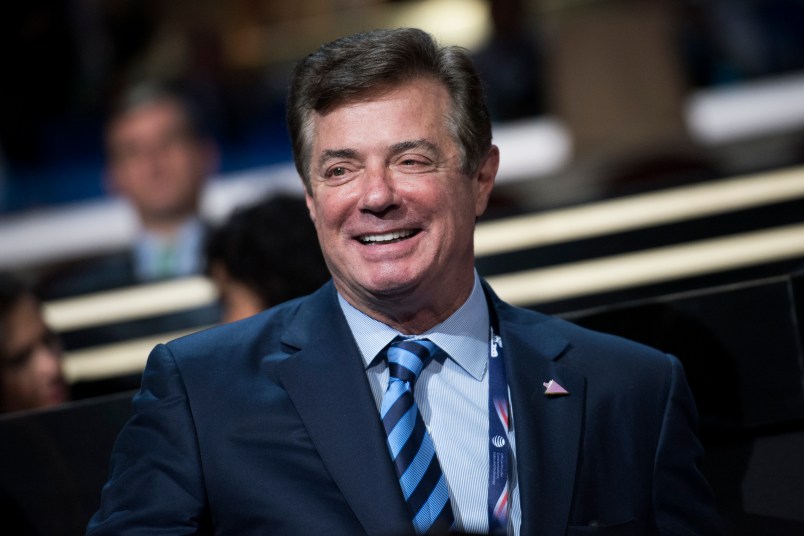Glenn Thrush of The New York Times has a very interesting article out on Paul Manafort. It contains no one blockbuster piece of information. In fact, it is oddly understated, leaving it to the reader to draw what I think is a fairly straightforward conclusion. The article is based on access Thrush received to a series of emails and memos Manafort prepared for Trump (Glenn, WTF? Please publish the actual memos and emails.)
The upshot is that Manafort aggressively courted Trump for the job, sold himself creatively and – key for Trump, one imagines – offered to work for free.
I’m pretty sure we knew that Manafort wasn’t being paid. This was the case for several key people on the campaign, if memory serves. What we didn’t know was the full mix of facts – most notably, how much Manafort sought the gig.
Remember that Manafort was first brought on board not as campaign manager but – notionally – to manage the delegate hunt and wrangling in the lead up to the GOP convention and at the convention itself. It later became clear that he served as de facto campaign manager pretty much from the start when he came on board in March 2016.
On its face, this delegate wrangling role had a certain logic to it since Manafort had been involved in wrangling delegates at the semi-contested 1976 GOP convention in which incumbent Gerald Ford saw off a challenge from Ronald Reagan. It was commonly said that Manafort was the only GOP player with experience at a contested convention – thus making him a key asset for Trump, who looked likely to face just such a challenge in Cleveland.
In fact, this really made very little sense. The nominal rules of conventions may be broadly similar. But the actual rules of presidential politics are profoundly different. What’s more, delegate wrangling is in many ways an exercise in patronage and intra-party factional politics. On those fronts, Manafort had been out of the game for a very, very long time. The idea that Manafort was a silver bullet for a contested convention or even a key asset was never really credible.
This isn’t to say that hiring Manafort was crazy. He had a rather storied career as a campaign operative. He brought some ability and level of experience. But he hadn’t been in the business for something like 20 years. Manafort was maybe the thousandth person you would have thought of for the job. Bannon was a crazy pick in a totally different way. But he came with the Mercer Family imprimatur and maybe no one had a better feel for the contemporary xenophobic hard right than he did. That was a real asset, whatever the baggage.
So why did Manafort get hired? That’s a very good question. The upshot of the story, though it doesn’t say so directly, is that there’s no clear explanation at all. The go between, according to Thrush’s article, was Tom Barrack, a mutual friend who seems like a surprisingly normal figure for the Trump world. Who knows whether there’s a story there? The key thing seems to be that Manafort really, really wanted the gig. And he was willing to do it for free, even though there’s nothing in Manafort’s history that suggests any interest in doing anything for free ever.
Why was Manafort so focused on getting in with Trump?
[Did you enjoy reading this post? Considering supporting TPM by subscribing to Prime.]






